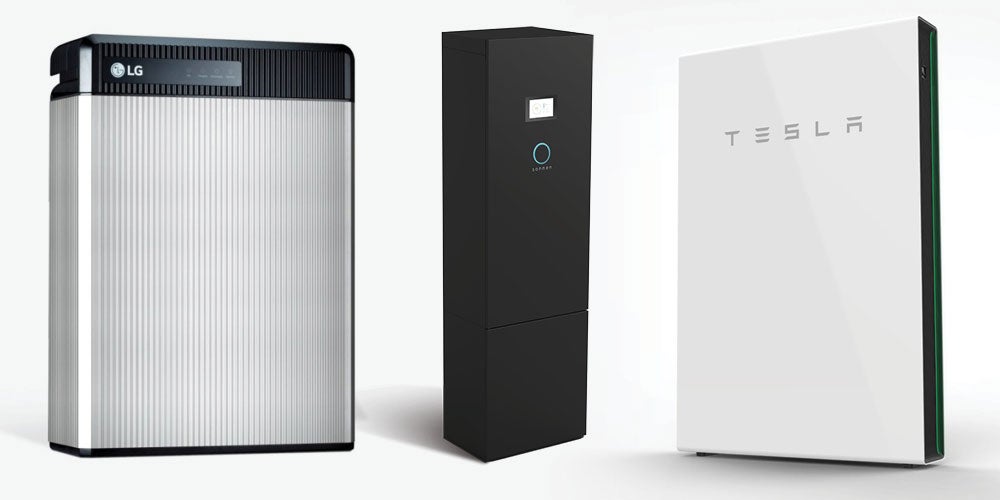
If you’ve been looking to install a solar panel system recently, you’ve probably come across the topic of solar batteries. Although battery systems are becoming increasingly popular, many homeowners still don’t know much about them.
Solar batteries let you store the energy your solar panels produce for later use. Pairing your solar panels with solar batteries to create what is known as a ‘hybrid solar system’ comes with a number of advantages, including access to reliable backup power and independence from your utility.
But how exactly do solar batteries work? And more importantly, how much do they cost? Keep reading to find out.
Why you can trust SolarReviews:
SolarReviews is the leading American website for consumer reviews and ratings of residential solar panels and solar panel installation companies. Our industry experts have over two decades of solar experience combined and maintain editorial independence for their reviews. No company can pay to alter the reviews or review scores shown on our site. Learn more about SolarReviews and how we make money.How solar batteries work
Solar batteries store the extra solar energy your panels produce that you don't immediately use so that you can draw from it later.
See, solar panels produce the most electricity during the middle of the day, which also happens to be the time when your home uses the least amount of electricity. A standard grid-tied solar system sends that excess solar energy back to the utility grid.
However, when solar panels are paired with a home battery, excess electricity goes into the battery instead of the grid. Then, when the sun goes down and your panels aren’t producing electricity anymore, you can use the energy you have stored in your battery - instead of paying for electricity from the utility.
This means you get to power your home with all of the clean, renewable solar power your solar panels produce, no matter what time of day it is.
How much do solar batteries cost in 2023?
Depending on the battery’s chemistry, a solar battery can cost anywhere from $200 to over $15,000 to install.
Most residential grid-tied solar panels are paired with lithium-ion batteries, which cost anywhere from $7,000 to $15,000 to install. Some small-capacity lead-acid batteries can cost as little as $200, but they won’t be able to power much in your home and are typically used as emergency backup power for RVs.
The following table lists some of the most popular solar batteries available on the market:
| Battery | Cost* | |
|---|---|---|
| Trojan (SPRE 06 255) | $213 | Buy Now |
| Tesla Powerwall | $9,200 | Buy Now |
| Enphase IQ 10 | $9,000 | Buy Now |
| LG Chem RESU Prime | $8,000 | Buy Now |
| sonnenCore | $9,500 | Buy Now |
*Estimated cost before installation
The cost of solar batteries has decreased over the past few years, but they still cost a pretty penny - and most people don’t have that kind of money just lying around. Luckily, solar batteries are eligible for the 30% federal solar tax credit, and some states even have additional solar battery incentives to help cut down on upfront battery prices.
Factors that determine solar battery cost
1. Solar battery manufacturer
Just like everything else you buy, the brand that you choose will impact the pricing of the battery. This is because different brands offer different services and have different manufacturing processes.
For instance, German battery manufacturer sonnen offers a luxury line of solar batteries, some of which cost upwards of $30,000. The Tesla Powerwall on the other hand, costs closer to $13,000, including installation costs!
2. Battery chemistry
There are many different types of batteries on the market, but most residential systems use lithium-ion batteries.
Two main lithium-ion chemistries are used for solar batteries: nickel manganese cobalt (NMC) and lithium iron phosphate (LFP). NMC batteries, like the LG Chem Prime, have been around a bit longer, making them slightly cheaper than LFP batteries, like the Enphase IQ.
While some homeowners choose to use lead-acid batteries instead of lithium-ion batteries because they are cheaper, they tend to have a shorter lifespan, lower capacity, and require regular maintenance.
3. Number of batteries installed
This seems like a no-brainer, but the more batteries installed, the higher the solar energy storage system costs. The number of solar batteries you’ll need depends on:
- How many kilowatt-hours of energy you use
- The storage capacity of the battery
- How many appliances you want to power
- How long you want to power your appliances
In most cases, in the event of a power outage, one to two solar batteries will hold enough stored energy to cover your energy needs and provide backup power to a few key circuits.
4. Backup load panel
In most cases, solar batteries can’t power everything in your home.
The important things will stay on, like your lights and your fridge, but you’ll need to install multiple batteries to have the amount of energy needed to power something like your air conditioner during an outage or if you’re off-grid.
Because a battery can’t power your entire home, you might need to install a sub-panel so that the battery will back up only the most important things in your home during a power outage. Installing a sub-panel, sometimes called a backup load panel or a critical load panel, will add $1,000 to $2,000 to the installation costs.
5. Labor costs
The amount of labor required to install your battery system will also impact the price of a home solar battery installation.
If the battery is being installed at the same time as the solar panels, the labor costs could be a bit lower because all of the electrical work and permitting associated with both the solar system and battery system will be completed at once.
However, if the battery is being added to the solar panel system after the fact, labor could cost more, as new permits will need to be filed, more incentive forms may be required, and some additional electrical work may need to be done to connect the battery to the existing solar panels.
6. Incentives and rebates
The cost to install a solar battery can also vary depending on what solar battery incentives are available in your area.
California’s solar battery incentive program, called SGIP, can cover almost a quarter of the costs of a battery installation. Other states, like Oregon, also offer solar battery programs that help lower upfront costs.
Plus, if you qualify for the federal solar tax credit, you can get an additional 30% off the cost of your battery installation, even if the battery isn't connected to solar panels.
Are solar batteries worth the extra cost?
Although pairing solar panels with energy storage is becoming more common, it doesn’t mean it’s the right choice for everyone.
Installing a solar battery storage solution provides the greatest benefits to homeowners who live in areas that experience frequent power outages, where full-retail net metering isn’t offered, or if there are battery incentives available in their area.
Solar batteries are also great if your main reasons for going solar are environmental, as it maximizes the amount of renewable energy your home uses.
However, if you’re only looking to save extra money, a solar battery might not be worth it for you. What we mean is, if you live in a state with full-retail net metering, you’ll be saving the same amount of money with a battery as you would without one. All the battery would do is add thousands of dollars to your solar installation and provide you peace of mind in the event of a power outage.
We have an in-depth guide on how utility net metering plans impact the investment in a solar battery to give you a better understanding of what could work for you.
Solar panels and solar batteries make a great pair
Installing a solar battery storage system can be a great way to get the most value out of your solar panels.
Batteries are an excellent source of backup power, they increase your energy independence and, in some cases, can even save you more money on your electric bill because you’ll be drawing power from the battery instead of the grid.
However, solar battery systems do come at a price. If you’re looking to save money on your electricity bill, installing a solar battery might not be right for you, especially if your utility offers net metering. However, if you live in an area that experiences widespread blackouts, like the ones in California and Texas, or somewhere with Time-of-Use (TOU) utility rates, having a battery backup to store energy for when you need it will be beneficial.
The upside is that the price of solar battery technology continues to fall, so much so that someday in the near future, solar batteries will come standard with all solar energy systems.
If you’re looking to pair your solar panels with storage, make sure you contact multiple reputable battery storage installers to ensure that you get the highest quality installation at the best possible price.
Key takeaways
- Most residential solar battery installations will cost between $7,000 and $14,000 when using lithium-ion batteries.
- The actual price of a solar battery installation depends on the battery manufacturer, chemistry, number of batteries installed, necessary electrical upgrades, labor costs, and incentives.
- Solar batteries are most beneficial for homeowners who live in areas that experience frequent power outages, have access to energy storage incentives, or don’t have access to full retail net metering.
